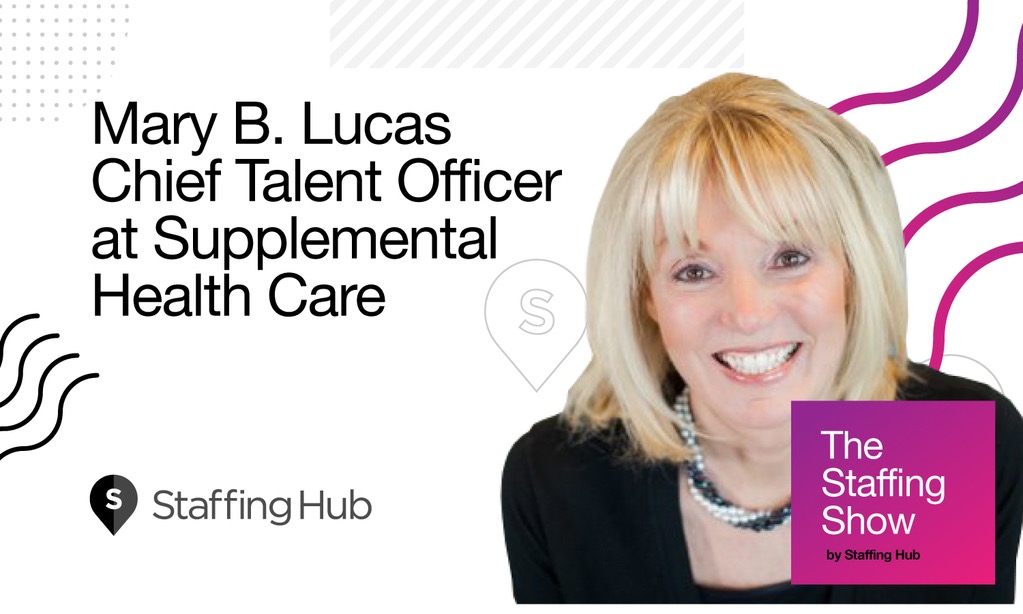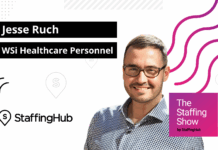
We’re excited to introduce the second season of The Staffing Show podcast, featuring Tim Robbins, Vice President at Monster; Matt Martino, Director of Digital Strategy at Medix; and Tara Sprakel, Chief Marketing Technologist, and Ryan Paulson, CTO at Fusion Medical Staffing.
Kicking off our season, we sat down with Mary B. Lucas, Chief Talent Officer at Supplemental Health Care, and author of Lunchmeat & Life Lessons: Sharing a Butcher’s Wisdom. She talks about her father’s “comeback sauce,” what it really means to succeed in the people business, and the future of staffing.
StaffingHub: Mary, tell me a little bit about your background.
Lucas: Well, first of all, thanks for asking me to join you, Caitlin. I’m thrilled to be here. I love having these kinds of conversations.
My whole life has been in the staffing industry.
When I look back right out of college, my first job was as a recruiter for a company called ADIA Personnel Services, which is now Adecco. I was there until I left and went to a company called Personnel Pool, which became Interim, which became Spherion, now part of Randstad. And then I did some work with a company called Staffmark, and now I’m with Supplemental Health Care.
So, my entire career has been in staffing. My dad always called it “the people business.” And, so now, I also love the fact that I’ve tied my personal and my professional life together. I’m not only a staffing industry veteran, if you will, but I’m also an author. I wrote a book about my father based on the advice he gave me throughout my career in the people business, the staffing industry. My father was a butcher by trade and the book is called Lunchmeat & Life Lessons: Sharing a Butcher’s Wisdom by Mary B. Lucas, BD. It’s a memoir and tribute to my father.
And, I know you’re a writer, Caitlin, and so I think you can appreciate, I think I really wrote it after my father’s passing more to deal with my grief.
I’m an accidental author but an intentional communicator.
And I loved keeping his legacy and his wisdom alive. And so it’s been really fun for me, well over 65,000 copies of the book later. It’s become a platform for me to stay connected in the industry by speaking and talking with others about how to make meaningful connections with the people around them, one person at a time. And I really believe that’s the key to success in our industry and the people business.
StaffingHub: Your book is so alive and so wonderful and you do such a good job of preserving your memory of your father and everything that you learned from him. And I find the storytelling is such a huge part of the staffing industry, just as any people business, it’s about connecting stories to each other. So I thought it was really beautiful that you have that connection there that you’ve spent such a long time in the staffing industry and that you found your way to connect your work to your life, your story. I was wondering if you could talk a little bit more about how your book and how being a butcher’s daughter prepared you for a people business like staffing?
Lucas: I was so full of myself at 22 years old — and I’m sure you were never full of yourself when you were 22 years old. But, I was a first-generation college graduate and I was the ninth of ten children from John and Mary Bichelmeyer. I was named after my mom, Mary. And my father was a butcher by trade, as I said, with an eighth-grade education. But he was the smartest man I ever knew and the patriarch of our family. It was such a busy family. And so lots going on, and I really didn’t see my dad very much as I was growing up, but he was there, but it was all, it was surrounded by crowds.
It was a day I got the job offer from ADIA Personnel Services, and the phone rang, 22 years old, and I answer it, and I said, “I got the job.”
And my dad’s over at the butcher block table and our family home and he calls me over and he goes, “You’ve got that job you wanted in the people business?”
And I looked at him and I said, so full of myself, “What’s a guy with an eighth-grade education, a butcher, going to tell me? I’m a college graduate and I’m going in the staffing industry.”
And he looked over at me and he said, “You got that job, you’re going into the people business.”
And I said, “No dad, I’m going into the staffing industry.” Like, oh brother.
And he looked at me, he just said, “Wow, get out of your own way, girl. You’re going into the people business. Don’t over complicate it. You’re going to find people work, that’s at the core of what you’re going do. And I’m in the people business. I help people put food on their table. Your mom is in the people business. She helped raise good, upstanding young people.
The less complicated you make it, the more successful and happy you’ll be. At the core of it, it’s all about making meaningful connections with people, one person at a time.
That’s going to be the key to your success. So maybe you ought to listen to me. I might be able to tell you a thing or two about how to succeed in the people business.”
And that really was when my relationship changed with my dad. I started listening to him. This butcher with an eighth-grade education became the greatest career coach I ever had. And again, that’s really why I wrote the book because I wanted my sons Chase and Nick to have the ability to know their grandpa. He died when they were very young. And, so the good news about being number nine of ten children was that your parents are really tired when you’re growing up. And you kind of got away with everything. But the bad news is that your children will never know their grandparents the way the older grandkids did. And that’s really why I wrote it. I wanted to keep his legacy alive and all the advice he gave me.
That sweet little book became something bigger than I’d ever imagined. And really the heart of it is about making sure that his legacy lives on for my family. So the fact that others get a little bit out of it, that’s great. But really it’s kind of my guidebook about how to make sure I slow down. Think about it: in this crazy busy world, the connections you make one person at a time, those are the connections that are going to serve you and the people you serve so well.
And I think that’s really at the heart of everything I’ve done in this industry. We find people work in companies. We connect with people many times when they’re the most vulnerable, when they’re scared and worried about what their next opportunity is going to be a career. So I love it after all these years, I still love what we do.
StaffingHub: You talk about this idea of the “comeback sauce” and I was wondering if you could talk a little about that comeback sauce that really connects both your career and your book.
Lucas: Well, it’s funny because there are so many little bits of wisdom in the book. I never know what’s going to resonate with someone after they read the book. Yet, comeback sauce is probably the one that I feel like really resonates with people. It’s a way you treat people, and it’s always this best lasting impression.
The essence of comeback sauce is: make a lasting impression. When you leave someone, make sure they’re a little better off because of their connection with you. And if you can do that, they’ll come back. You’ll build a legacy of people who want to work with you.
I can’t tell you how well that served working at different staffing companies. I’ve worked with many of the same people over and over and over again. We come back to each other even if we’ve gone somewhere else for a while. And the essence of the comeback sauce is you want to leave everybody a little bit better off after their interaction with you than they were before so that they’ll come back and want to work with you again.
I remember when my dad shared it with me, I kind of rolled my eyes again. Remember, I’m 22 years old. I’m taking my first job as a recruiter and my dad says, “Okay, you’re going into the people business. I might be able to tell you a thing or two about how to succeed in the people business.”
I said, “All right, I’ll get out of my own way like you said, I’ll listen to you. What’s the key to success?”
He goes, “Don’t forget the comeback sauce.”
I said, “Dad, I shadowed the recruiter in the office I’m going to work at, and there are a lot of people we don’t want to come back. I don’t think that’s going to work for me. It might work for you, the meat market, you want them to all come back. It’s not going to work. There are people that aren’t no shows, no calls. There are people that don’t have the right skills or qualifications. We don’t want to work with them.”
And then he looked at me and he said, “Wow, for an educated young lady, you have a lot to learn.”
I said, “What do you mean?”
He goes, “It’s not whether you want him to come back or not. Don’t take it so literally. It’s about how you want to make them feel about their interaction with you. Those people you have to deliver bad news to, those people you have to let down or let go — you want them to leave thinking, she handled that in a way that was nice, that was high integrity. Maybe what I did wasn’t so great, but she treated me in a way that showed that she was caring. Even if I was let down or let go, you treated me in a way that was nicer than anybody else ever treated me. And I appreciate that and I won’t forget it.”
So a lot of times people want me to talk about that story. I do have a TedX Talk. I found, after starting to speak a lot about the book and sharing this concept, that people want a recipe. After telling this story, I realized there is a recipe for comeback sauce. I don’t write about this in the book. The ingredients are always different because everybody’s different. What’s important to you is not important to someone else. But at the essence of it is the recipe is:
- One part recognition
- One part connection
- Add a dose of the unexpected
Make sure you always recognize the person you’re connected with. And it’s that connection to what’s important to you, whatever that is — acknowledge that. And then you add a dose of the unexpected.
And it may not be that much, sometimes comeback sauce is just a thank you note. One of my favorites right now is, I don’t know if you’ve ever downloaded the app TouchNote. But when I go somewhere, for example, for a speaking engagement, I like to take a picture, maybe a selfie with the people I’m with and then quickly put it on TouchNote: “Thanks for including me or thanks for—“ whatever our connection was, I’ll acknowledged what it was. And there’s a little memory of us together afterwards.
So I think it’s just about great service and it’s one of the things that you can do to make sure, again that you create that kind of lasting impression that will make sure you stay connected with people at a higher level.
StaffingHub: In staffing right now, there’s so much focus on balance, on automation or technology, but really clearing a space to build those relationships and make an impression that is beyond anything, beyond the computers and beyond anything else, just using technology to build those strong relationships that seems so integral. I’m wondering if there are any other lesson from your father that you think are crucial for the staffing industry right now?
Lucas: Oh, I mean there are so many, but I really do think it’s important to get out your blinders and put them on and not really caught up in the things that are going around you. And ultimately we are in the people business. So it’s important to look at all these other things that could distract you from the destination and where you’re headed.
I learned workhorses wear blinders for a reason. So they focus on the destination. They don’t get caught up on what’s going on the right and what’s going on in left. They focus on their destination and where they’re headed. And I think it’s so simple, but that really is one of the ones that I think you can get so caught up and go get so distracted as fast as we’re moving.
Nobody makes you happy but yourself. Don’t take life so seriously. You’re never going to get out of it alive anyway.
My favorite one is: if you don’t have a happy birthday, it’s your own damn fault. It really means that you don’t look outside of yourself for your happiness. You have to pull that from within. And I don’t think that’s any different in the staffing industry as a people business than it is just in life in general. It’s just great life lessons, if you will.
StaffingHub: With that in mind, what do you think are some of the top challenges facing the staffing industry right now?
Lucas: The staffing industry is changing so much and honestly that’s part of the reason why I’ve loved it for all these years.
I can’t tell you how thrilled I am that at this point in my career I made a shift from commercial staffing and I now work with Supplemental Health Care as their Chief Talent Officer.
And I love learning. I’m a lifelong learner. That’s what I’m shooting for and what I’m learning by what’s going on in the healthcare space right now. I think it’s just fun to always have all the change. It’s always, it’s so different than when I started.
I think the changes we’re facing now really reflect the changes and the expectations of the workforce. When I started working 30 something years ago, the goal was to get a job with the right company and grow and stay there your whole career.
And that’s just not the case anymore. People are looking for that stability of a permanent work home. They don’t really want that. They want to learn new things.
Those in the workforce right now, they want to try different workplaces and they want more flexibility in their work situation.
And that might be working from home or work in a series of short term projects. And people talk a lot about the skills gap or competitive pay or a lot of number of things that are the challenges.
But to me, at the heart of it, is how we make those meaningful connections with the people we’re working with, both of those as their staffing partner and as their advocate.
And for me, at Supplemental Health Care, that’s really what we’re focusing our efforts on.
We are a culture of caring and honestly. And I think we might be the best-kept secret in the staffing industry. We were quite a little company and we’re about ready to make a bigger bang. So watch for us.
But the people who work with us love us. Our NPS scores are over the top. We’ve been voted best places to work. At the heart of it is, what do you care more? Do you give more, do you make sure you put more into that connection? And that’s I think what we do here and that’s what I think is going to continue to help us grow.
StaffingHub: Congratulations on those high scores. I know that there’s a lot of hard work too, a lot of smart choices that you guys made. Are there any specific tools or strategies that you, in addition to just really practicing caring more about candidates, but are there any tools or tactics that you think have been a part of the supplemental success?
Lucas: Well, I’m not going to give away all of our secrets! But my main priority is making connections. So at SHC, we talk a lot about caring, how we can care more for our teams, for the healthcare professionals we partner with, for the clients who trust us to find them the best people.
And what does that look like? I think the answer is, it looks different every person. So the way you show you care is different from the way you would show it to someone else.
I think the key is really to empower your people with the ability to make those individual connections and create what we call “Care More Moments.”
We give an award every quarter on our town hall calls for someone who has created a Care More Moment.
We showcase that and we tell the stories and we have a Care More Spotlight where we showcase a healthcare professional.
I’m just telling you, that’s what makes me love this so much. Today there was someone who we had in a correctional institution on a traveler assignment. And the community where she was traveling, she sent us a picture, and she was next to a veteran who was homeless and it was cold. And she stopped on her way to her assignment and she brought blankets for him, and she showed us the pictures and told us a little bit about his story.
That was my first email this morning when I walked in. And I thought that the culture of caring goes from how we treat the people we place, we put on assignments, that we advocate for, and then it just shows that how they treat the people they’re connected with. So I’ve just, I love those stories.
StaffingHub: That’s beautiful. Do you have any other stories like that? That’s really lovely, it seems like a lovely thing to get our listeners to think more about, can you think of any more culture of sharing stories like that?
Lucas: Our Care More Spotlight recipient last quarter, she had one of the patients that she was caring for who was getting ready to go through chemotherapy and was really worried about losing her hair. And she shaved her head. So here’s the picture of her right next to the person that she’s caring for.
There are different stories every day. And then again, our internal team members that go the extra mile. We had someone on assignment in Chicago and Lawrence who’s in our Chicago office, he knew he was watching some basketball games by himself, and he went over to where he was staying in brought him a pizza.
So, I just think it’s just, I’ll still have little stories that we hear, too. You’re not even near in our virtual world that we live in. You’re not even near where no one else lives.
One of our internal team members went to a funeral of one of the nurses that they placed lost their family member. They were just a shock that they drove three hours to get there and yet it was like, “Of course I did. You’re important to me and this is a difficult time for you. Of course, I’m going to be here.”
You can imagine the kind of loyalty that comes from those types of connections. We’ll be there when you need us. We’ll support you no matter what.
And I mean I could go on and on of stories, but just so proud of being a part of this organization and that this culture of caring because it’s everywhere around me. And those are things that motivate us cause we hear about it every day.
StaffingHub: How do you think we can bring more of that kind of devotion and caring into the staffing industry in general? What do you think inspires that in your team and how can others be a bit more like you?
Lucas: I think it’s really about: what do you value? what is it that you are looking at? I firmly believe if you take care of the people you work with, they’ll take care of you. The people you work with and that culture of caring will grow.
And I don’t want to put anybody, especially me, up on a pedestal because we’re all works in progress. I mean, I am the last person to say that I don’t have those days when my blinders fall off or that I get caught up in things and get overwhelmed. I would call it the whelmed state. There’s so many different things going on.
But I think really that culture of caring and that starts with leadership and I don’t know a more caring person really than our CEO Lesa Francis. And when I talked about, I’m so proud again in this, there aren’t that many people in the C-Suite that are female leaders, and Glassdoor recognized her as one of the top CEOs in the country.
She was one of the top two female CEOs a couple of years ago, based on ratings. You don’t get that kind of loyalty and people who will work with you from company to company to company without being a caring person.
And not that she’s not focused, obviously, on producing results, but I think she firmly believes you produce results by making sure you start with caring for the people and then they will care for the customers.
They will care for the healthcare professionals that we place and our business will grow. And it served her well and numerous companies that I’ve had a chance to connect with her with. But I think our leadership team in general. Linda McDonnell, or leader in Travel Nurse, Monty Houdeshell, or CFO, Donna Carroll I’ve worked with before. Donna’s the president of our local offices and workforce solutions. And then I work with Chris Long who is one of the most talented people I’ve ever met from an operations level. So, I think our leadership team cares about each other and we care about creating that type of environment for people to feel like they’re part of our SHC family. I think it really starts with how we behave and how we show up.
StaffingHub: Zooming out a bit, how do you see the staffing industry changing in the next five years or so?
Lucas: I have no idea. I can’t believe how quickly it’s changing. I just hung up on a call with another potential vendor for an AI opportunity for us.
We’re always looking at what are the best sources to make sure we balanced everything we can possibly do to get that inbound traffic, to get really that active job seeker — how do they find us? How do we make sure that we are in a position where they see us when they’re doing their searches. But obviously that passive job seeker and building that brand so people know that we’re a company that is available for them.
But I really don’t have any idea. I think we’re going along and looking at every opportunity we can to make sure we maximize technology. But like I said, part of what I love about the industry is that it’s constantly changing.
I do think you’ll see a lot more untraditional work models, job sharing, flexible environments, where that’s possible. And I think you’ll definitely see a lot more AI and automation, which is going to make it even more of a challenge to make or nurture those important connections.
I think it’s critical honestly for any company, but especially staffing companies, to keep that personal connection in mind as we’re all implementing artificial intelligence in the years to come.
I know for a fact that people want and expect better technology, more automation, we have to keep pace with that, but we can’t lose that personal connection.
I don’t think you can get more personal than connecting with someone when they’re vulnerable and they’re looking for an assignment, a role, a job, a position, when they’re thinking about how they put bread on the table.
I think that, that human element combined with everything we have, that’s so fantastic from a technology support standpoint. That’s going to be the killer combo, I think as we go forward. And so the next five years and beyond, I can tell you all these years in the industry, it’s so different from when I started. And I can’t imagine that five years from now it’s not going to be very different as well.
StaffingHub: Definitely and no matter what happens, I think that the job search and the process of finding a new career is going to continue to be a vulnerable place. And staffing is going to be an industry that cares for people in that vulnerable spot. So I’m wondering if you might want to leave us with the best career advice you’ve ever gotten.
Lucas: Oh, it’s funny because I’ve been lucky enough to be asked to do a lot of these podcasts lately. And I love when someone asks me that question because I have so many bits of wisdom from so many great leaders that I’ve worked with.
I was lucky enough to meet Stephen Covey when it was very early in his career before he even wrote the book, Seven Habits of Highly Effective People. And I think his advice and the concepts of abundance mentality versus scarcity mentality are so powerful for me.
And I think reading Hyler Bracey and meeting him as a speaker for our organization and his concept of managing from the heart, I value that as well.
And great leaders give me advice like: hire people as good or better than you or trust people a little bit more than they deserve. And everybody gets an A, it’s theirs to keep or theirs to lose. You start out with any relationship with this high level of expectation and how many times you will rise up to meet that.
But, I will quite honestly say, the best advice I ever got was the advice my father gave me on his last day. And that’s the last chapter of the book, Lunchmeat & Life Lessons.
The last chapter is a story that really inspired the entire book. And that inspired me to keep his legacy alive and write it.
He told me he had hours to live, they said, and I was, as you can imagine, quite emotional. My mom had already passed away five years before, and I was about ready to lose my dad.
And I remember turning to him and just crying and saying, “Dad, what am I going to do? Who’s going to inspire me now? What am I going to do?”
And he just looked at me and he was completely awake, and I said, “Who’s going to inspire me now?”
And he looked at me and he said, “Oh, Mary, that’s so easy. Your mother and I have taught you well: you’ll inspire yourself. You’ll figure it out and inspire yourself.”
And that’s really, I inspired myself when I wrote Lunchmeat & Life Lessons. And I inspire myself when I keep his legacy alive. And today I inspired myself when I shared some of the wisdom from others that I’ve worked with and closed with really that last bit of wisdom that he shared with me.
And so that’s what I try to do every day is look at again, you’re looking for within for inspiration. It comes from you first. Nobody fills you up but you. You surround yourself with people that make you as good or better version of yourself every day. And it’s not hard to do that, but it’s work. And I think that’s the best advice I’ve ever got, I have ever received was that: inspire yourself.
StaffingHub: That’s beautiful. And I think that that’s the best advice that we’ve ever gotten on the podcast, so thank you for sharing that with us, that’s so beautiful. And thank you for taking the time to talk to us today. I really appreciate it.
Lucas: Oh, I really, I really enjoyed it Caitlin. And I wish you all the best. I know you’ve got a lot of fun things on your horizon. I wish you the best as you’re doing a little bit of writing and deciding how you share my family memories as well. So thanks for having me and I appreciate the time.
StaffingHub: Thank you. Thank you so much. I appreciate it too. That was beautiful.
Looking for more podcast episodes? Check out our Staffing Show archives. Staffing







